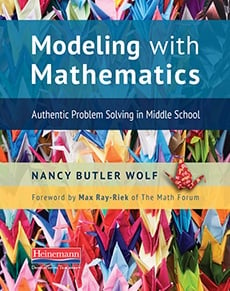
Modeling With Mathematics: Authentic Problem Solving in Middle School by Nancy Butler Wolf is out today! In the book, Nancy provides clear, friendly guidance for teachers to use authentic modeling projects in their classrooms. She provides detailed examples and hands-on activities that support students in developing key problem-solving skills and becoming engaged mathematicians.
In today's post, Nancy argues for the necessity of rich, authentic, and engaging problem solving tasks for our math students.
That’s Fine for Your Students, But…
by Nancy Butler Wolf
I have been talking about authentic problem solving, discovery learning, project-based learning, and mathematical modeling for a long time. The more I included authentic problems in my classroom, the more I wanted to learn about them and use them. You see, I realized that when my students were given the opportunity to work on real problems, when my students could make a connection between the math classroom and their real lives, when every student was given a voice in the classroom, they thrived. The dreaded refrain of math students— “When are we ever going to use this?”—was heard less and less frequently in my classroom, and I was sold.
After building some success in developing and delivering these problem-solving tasks, I began sharing them with other teachers. Many teachers jumped on board, willing to put the time and effort into implementing these tasks in their classrooms. However, at nearly every professional development where I shared my excitement over this way of teaching and learning, I heard some variation of this: “That’s fine for your students, but it will never work with mine.” These teachers shared stories of students woefully lacking in basic skills, or students who were completely unmotivated and uninterested in math. They were convinced that these students could or would never engage in rich problems requiring critical thinking and decision-making.
“That’s fine for your students, but…” Let me tell you about my students. For the past fifteen years, I have worked largely with students who have been unsuccessful in math. When I taught at the traditional high school, I was assigned to classes full of students who had failed algebra two or three times already. In the last five years, I have taught at an alternative school working with students who have been credit-deficient, failing many classes (some of them, every class) at the traditional high school before they came to us. The majority of our students are socio-economically disadvantaged, many are in foster care and many have been involved in the criminal justice system. We work with students with a variety of identified and unidentified disabilities. Many of our students have, for a variety of reasons, missed months or years of their education. Some of my students have babies, incarcerated parents, or live in motels. They have huge holes in their educational toolkits, and better things to worry about than problems 1 through 33 odd.
When my students are given the opportunity to succeed, they will grab it and run with it.
Let me tell you something else about my students. They think, they feel, and they can learn. When they are given the opportunity to succeed, they will grab it and run with it. I am constantly excited and gratified to see a student for whom math has always been a source of frustration or anxiety or shame get excited about creating the ticket pricing levels at an amusement part, or designing an effective skateboard kicker ramp, or figuring out how many calories in the fast food they eat come from fat. Success builds on success, and when these students are given an opportunity to contribute, they can find success. I cannot tell you how many times I have had students say to me, “I always thought I was stupid,” or “I never thought I could understand math.” Yes, getting students to dive in and get started takes some patience and guidance, but when we provide students with the opportunity to think and contribute to solving authentic problems, we show them that they are capable of a depth of understanding they may not have experienced in a math class for a very long time.
I’d like to share the story of one of my students, Ricardo. Ricardo was a very capable young man, but had been incarcerated in juvenile detention for a good part of his high school career, was behind in classes and credits, and quite shut-off from his classmates. We started working on the 1000 Paper Cranes project (the featured task in my book) by learning to construct origami cranes. The process is a little complicated at first, but Ricardo picked it up quickly. Ricardo would finish his other work early, and pick up some origami paper. In the first few days, he must have made dozens of paper cranes. One day, one of my colleagues asked me, “What have you done with Ricardo?” and explained that he had been in the hallway at break time, patiently teaching the other students how to make origami cranes! Ricardo went on to excel at the entire task, and was a leader with his classmates while working collaboratively on the project (and on other tasks through the rest of the year).
I truly believe that including rich, engaging, authentic problem-solving tasks in the classroom is not only good for my students, but for all students. In fact, it is not only good for them, it is necessary. All students, regardless of their history of success or failure in math, can contribute to classroom discourse, can reason and make decisions, and can gain a depth of understanding of the world around them through engagement in authentic problem solving tasks. All students deserve the opportunity to understand how math works in their everyday lives.
So let’s work on this together. “That’s fine for your students, but you don’t know mine.” Your students are my students, and I know they can reason and they can learn and they can be excited about and engaged in mathematics. They can find success in the math classroom, and they deserve the opportunity to try. That’s fine for my students, and for your students too!
♦ ♦ ♦ ♦
 Nancy Butler Wolf is a national math consultant and curriculum developer who has served as a member of NCTM’s Illuminations Writing Group. She has over 30 years of classroom teaching experience and has presented at various conferences on mathematical modeling and algebraic reasoning. Follow her on Twitter @drnanbut.
Nancy Butler Wolf is a national math consultant and curriculum developer who has served as a member of NCTM’s Illuminations Writing Group. She has over 30 years of classroom teaching experience and has presented at various conferences on mathematical modeling and algebraic reasoning. Follow her on Twitter @drnanbut.


